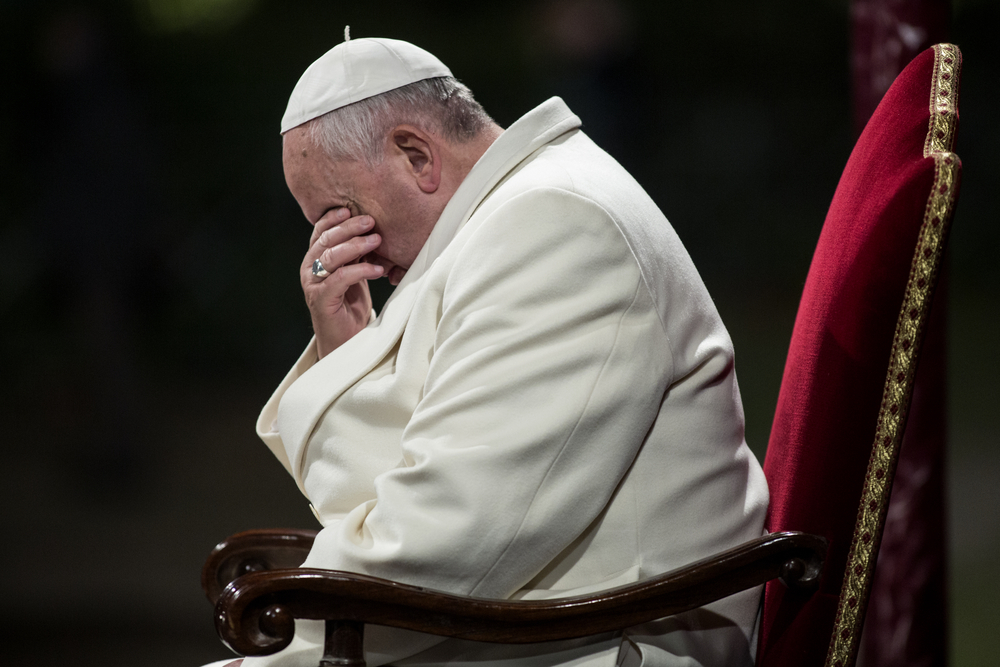Pope Personally Apologizes to Indigenous Canadians in Historic Meeting

In May of 2021, the world was met with a shocking discovery. Anthropologists working in Kamloops, British Columbia, detected anomalies in the ground via radar scans. Upon examination, experts concluded that around 200 unmarked graves lay beneath the surface. The months that followed would yield similar grim findings and cast new light on a tragic part of Canada’s history.
Each of the gravesites was uncovered where a Canadian Indian Residential School once stood. Canada’s Indian Residential School System was a program of forced re-education mandated by the government and administered by various Christian churches. The program was characterized by the forced separation of Indigenous families, rampant physical abuse, and staggering death tolls due to neglect and illness. The tragic legacy of these boarding schools carries on to this day.
The Role of the Catholic Church
The Roman Catholic Church was complicit in the oppression of Indigenous people while this program was in place. As a part of the government’s policy of forced assimilation, Indigenous children were mandated to accept Christianity. To ensure that they did, the Canadian government provided funding to a number of Christian denominations so they could open and operate these schools.
While the government provided funds, maintenance, and facilities, the churches were allowed to handle lesson planning and discipline as they saw fit. Under this policy, Indigenous children could be punished for speaking their native languages and practicing their own spiritual practices.
For much of this program, the Catholic Church was disproportionately represented. At its peak in 1931, the Indian Residential School System consisted of around 80 boarding schools. Of these, more than half were operated by the Catholic Church. For this reason, many Indigenous people see the Catholic Church as directly responsible for lasting generational trauma within their communities.
In the years since, various representatives of the Church have alluded to the atrocities committed under the Residential School System. However, a recent statement by Pope Francis is the first formal apology extended to Indigenous Canadians on behalf of the Church.
The Pope Apology
Over the years, bishops practicing ministry in Canada have issued their own statements on Catholic involvement in the Residential School System. Generally, though, these statements were made of their own accord rather than sanctioned by the Church.
In 2009, a delegation of Canadian bishops and First Nations representatives obtained an audience with then-Pope Benedict XVI. The delegation sought an official apology from the pope, but ultimately left disappointed. The official statement acknowledged that acts of abuse were intolerable and offered prayers to the victims; however, it did not offer an apology.
In early April of 2022, a similar delegation of First Nations representatives traveled to Rome to meet with Pope Francis. Considered by many to be a more progressive Catholic, Pope Francis is the first to extend a personal apology in solidarity with Canadian bishops who have already done so.
In his statement, Francis condemned Catholic boarding school practices as “deplorable” and asked his God for forgiveness. Additionally, he expressed his intention to travel to Canada in July to meet with survivors and their families.
Why Apologies Are Important
The words of Pope Francis are the first step toward healing. Something as destructive as Canada’s history of oppression against Indigenous communities required millions of people to be complicit.
When institutions like the Catholic Church acknowledge wrongdoing, it helps to affirm the experiences of those who were harmed. Additionally, it lays the groundwork for dialogue and reflection among individuals who justified inhumanity in the name of faith or ideology. Of course, apologies are not able to change the past. However, they are critical to fostering hope for a better future.

